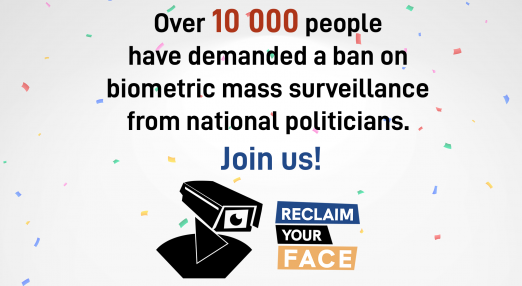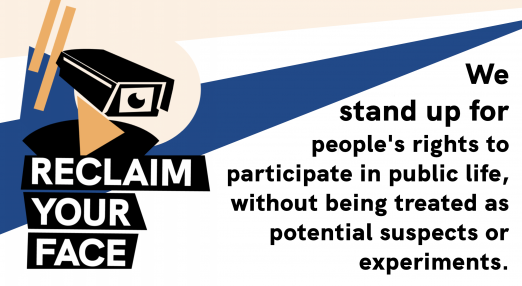Blogs
Filter by...
-

Envisioning a Decolonised Digital Rights Field – and Charting Next Steps
This week, a group of 30 participants, working on issues of racial, social and economic justice, digital rights, and in philanthropy, came together to not only collectively imagine just that, but also to identify the building blocks for a process that might help us get there.
Read more
-

EU alphabet soup of digital acts: DSA, DMA and DGA
Members of the European Commission appointed in 2019 agreed to put digital policies as one of the cornerstones of EU legislation between 2019-2023. These include the Digital Services Act (DSA), the Digital Markets Act (DMA) and the Data Governance Act (DGA). So, what are the differences between these acts?
Read more
-

10,000 people demand a ban on biometric mass surveillance
Reclaim Your Face is a European movement to bring people’s voices into the discussion around the use of biometric data to monitor the population. Since its launch only two weeks ago, over 10,000 people have signed their support by adding their name to the call for transparency, red lines, and respect for humans in European uses of biometrics.
Read more
-

EDRi-gram, 25 November 2020
On 12 November 2020, 12 organisations from across the EDRi network launched the first ever pan-European civil society movement against biometric mass surveillance: Reclaim Your Face. Over 10 000 people signed the petition so far. Join us!
Read more
-

How (not) to set up a public warning system
What is the best way to alert people about catastrophes? Germany went with proprietary apps which caused the recent warning day ("Warntag") to become an official failure. EDRi member Free Software Foundation Europe (FSFE) analysed the situation and found more robust solutions that respect user rights.
Read more
-

Walking from Luxembourg to Brussels in two hours
A public hearing before the European Court of Justice (ECJ) last Tuesday, November 10, dealt with the compatibility of Article 17, more precisely the provisions of Article 17 that require platforms to block copyright infringements, with the Charter of Fundamental Rights.
Read more
-

A vicious circle? Enabling privacy-friendly alternatives to behavioural advertising
EDRi member Panoptykon Foundation published a report “To Track or Not to Track: Towards Privacy-Friendly and Sustainable Advertising” which argues that there is only one winner in this supposed “win-win” situation: the ad tech industry.
Read more
-

WTO trade talks must respect privacy
Together with over 40 consumer and digital rights groups, EDRi calls on global governments to place people’s fundamental rights to data protection and privacy at the centre of digital trade negotiations.
Read more
-

Japan Trade Deal punches USA-sized hole in privacy
EDRi member Open Rights Group discusses the challenges that the new UK-Japan trade agreement poses to data protection rights in the UK.
Read more
-

Member in the Spotlight: Liga voor Mensenrechten (League for Human Rights)
Liga voor Mensenrechten (League for Human Rights) focuses on the balance between freedom and security; the rights of prisoners; privacy; and non-discrimination. The organisation has a strong track record with respect to privacy, including government surveillance, counterterrorism and policing.
Read more
-

EDRi-gram, 12 November 2020
We have watched as governments have abused their power to put limits on people’s freedoms, and as companies have exploited the situation to gather ever more biometric data about us. The Reclaim Your Face coalition has risen up against the widespread abuse of our biometric data before and during the pandemic.
Read more
-

EDRi-gram, 28 October 2020
Data brokers are key actors in the hidden data ecosystem. The data they collect and later sell can be used for a range of different purposes, from commercial advertising to political campaigning, and in some worrying instances, law enforcement.
Read more
